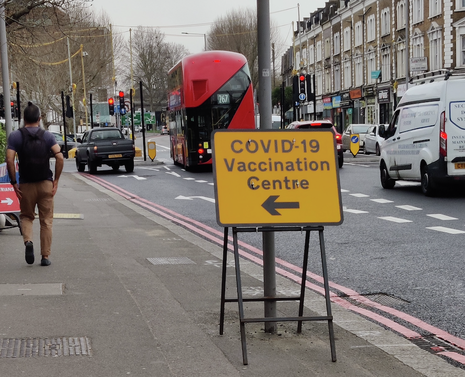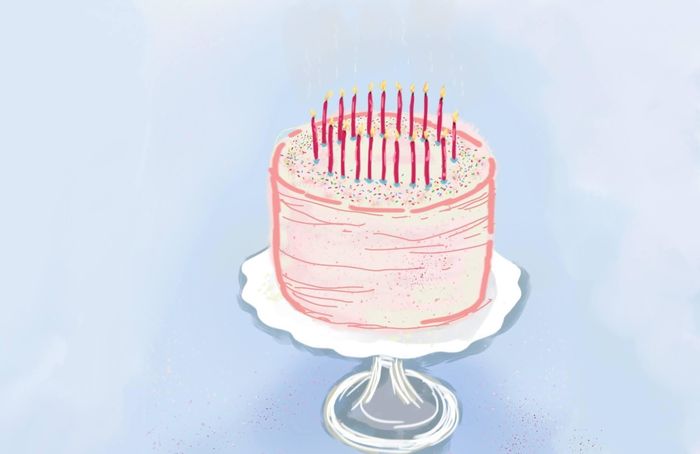The life-changing banality of my first COVID-19 jab
Alex Haydn-Williams reflects on his experience getting the COVID-19 vaccine

Every society needs rituals, its red-letter days that make a transition real. An offer letter; Saturnalia; your final GCSE. One day, 31st March will be marked as the anniversary of my first Covid vaccination. “A humid day when the buses were on strike and I had to leave enough time to walk all the way to the leisure centre,” recite after me, grandkids! But for now, it’s just today.
That’s what seems striking about getting vaccinated: absolutely nothing. I think the NHS made more of a song and dance out of my last eczema prescription. Mum heard on the radio that carers for vulnerable people were eligible: I looked on the website, and before I knew it, I was at a blue trestle table reciting ‘Alexander Haydn-Williams’ and my birthday.
Brentford Vaccination Centre is in the basketball courts where we did P.E. lessons at primary school. I found this slightly odd and told the volunteers. There were smiles in their eyes. “Did you go to school locally, then?” “Yes, just over the bridge. But this is the first time I’ve ever wanted to come here.”
I was ready. So ready. I’d arrived half an hour early with my reference number printed out three times. One of the volunteers poked her iPad and asked if I had any coronavirus symptoms. I responded, quickly: “I don’t, no,” then realised that sounded like I’d said “I don’t know,” panicked, made some noises like a Richard Curtis hero whose trousers have fallen down, and then realised it didn’t matter. As much as it looked like an exam hall, this wasn’t a test.
“Few words have ever contained as many different realities as ‘the pandemic’”
There weren’t any complications, or awkward questions. The volunteers were all ages, all hard-working, all brilliant. It was the same combination of hope, optimism and plasterboard that ran the 2012 Olympics. The HOME - VISITORS scoreboard was off. I resisted the urge to start skipping. I was called forward from my plastic chair. A little, painless syringe later, I was ferried to the exit. I got a little sticker.
Walking back over the bridge, I cried a bit. It hit me that, from now, life would become gentler, easier. Later, waiting in a masked line at our local bakery, I thought about Virginia Woolf walking through the blackout in London, thinking that the city had gone back to its eighteenth century darkness. She could tell her era was abnormal, historic, but she couldn’t escape it. Women had no power over the war; they simply had to suffer its effects.
It sounds like a profound, mythic parable. But Woolf knew, as we do now, that living through historic events is banal. She wrote about badgers and foxes wandering the unlit streets, not the development of a new kind of warfare against civilian populations. Only the retellings of history seem historic. The reality is reading the same laminated sheet of questions about allergies twice, and smiling.
“It’s the vastness, and the smallness, that makes this possible,” Woolf said about researching her biography of Roger Fry. It was 1940; invasion looked imminent. “So intense are my feelings (about Roger); yet the circumference (of the war) seems to make a hoop round them. No, I can’t get the odd incongruity of feeling intensely and at the same time knowing that there’s no importance in that feeling. Or is there, as I sometimes think, more importance than ever?”
“We won’t remember what’s on the news, we’ll remember our personal narratives”
Few words have ever contained as many different realities as ‘the pandemic’. Some of us will tell a story of socially distanced picnics; some of us will tell a story of a year spent alone. We won’t remember what’s on the news, we’ll remember our personal narratives. At first, we watched the press briefings every day. But once we’d lived in the pandemic for a while, like Woolf a year into the war, the news faded. It became a backdrop for the little emotions that truly mattered. Some of us had a bad time, some had an awful one, some managed. Our solaces were intense, small, personal solaces, and when we wept, we couldn’t weep on a friend’s shoulder.
In the bakery, the girl on the counter said she liked my jumper. I replied that it was William Morris x H&M; she said he wouldn’t have approved. I bought two pasties and a slice of pie. The bag felt heavy, and I wondered if the pasties had grown. Heading home, I walked past a corner shop where a sign in the window read ‘WE HAVE Snacks / Crisps / Ice Lollies / Gloves / Sanitiser,’ followed by a smiley face. On the pavement outside, a man was sweeping away cigarette butts and face masks.
When I got back, I realised it was my arm feeling a little heavy, not the bag. This was proof, of course, that I needed the day off to recline dramatically and drink tea. A slightly anticlimactic lack of side effects followed. Don’t tell my parents; they’re brewing more Earl Grey as we speak. But I managed to make a decent enough fuss to avoid any work.
We tucked into warm parcels of shortcrust pastry, and I thought about the pain of the last year, and the day Pfizer released their preliminary results. I couldn’t stop crying when I heard. Now, that momentous news had turned into a real moment. It’s a red-letter day, this: the mundane, life-changing beginning of the end.
Vaccinations have started for some young people. At the moment, 18-50 year olds who have a range of conditions including learning disabilities and diabetes, or who live with a vulnerable person, can book an appointment at a mass vaccination centre via the NHS website. See if you’re currently eligible. If not, keep an eye out, book one when you can.
Though young people may be safer than others from the virus’s worst effects, if we want transmission rates to fall across the country, we should get the jab. Even if you aren’t vulnerable, making the choice to get vaccinated is an act of kindness towards those who are. It’s not just a passport to sticky beermats: it’s an easy, quick way to protect our families, our neighbours, and our friends. That’s the difference between us and Woolf: in the face of great events, she was powerless to change the course of the war or save lives. We aren’t.
 News / Eight Cambridge researchers awarded €17m in ERC research grants27 December 2025
News / Eight Cambridge researchers awarded €17m in ERC research grants27 December 2025 News / Clare Hall spent over £500k opposing busway 24 December 2025
News / Clare Hall spent over £500k opposing busway 24 December 2025 Comment / League tables do more harm than good26 December 2025
Comment / League tables do more harm than good26 December 2025 Comment / The ‘class’ of Cambridge24 December 2025
Comment / The ‘class’ of Cambridge24 December 2025 News / Caius mourns its tree-mendous loss23 December 2025
News / Caius mourns its tree-mendous loss23 December 2025









